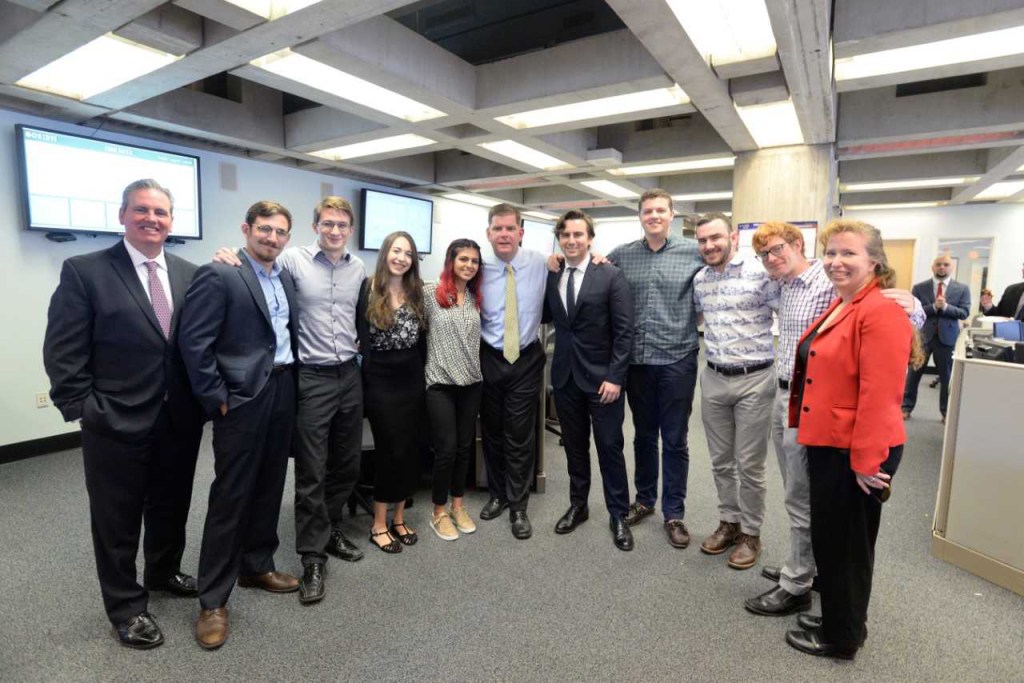Students, graduates reflect on Northeastern’s co-op partnership with Boston 311

“It has a startup vibe, which you can’t find in many government agencies,” says Elizabeth Torres, SSH’15, MPA’18. It’s early-July and Torres is describing the office culture at Boston 311, a service enabling Boston residents to report non-emergency issues to the city. “Here,” says Torres, a staff assistant for the past two years, “we have the opportunity to redefine what government services look like.”
Torres is one of four past co-op students at Boston 311 who have gone on—or will soon go on—to work for the service full-time after graduation. The other three—Jamie Silva, SSH’17, now the co-op supervisor, Charissa Luthman, SSH’14, now the operations coordinator, and Gabrielle Ulubay, SSH’17, who is currently transitioning from a part-time to full-time role—echoed her sentiments, saying that the office has transformed how some Boston residents view big city government. “We’re the first point of contact for people looking to connect with the city,” says Luthman, “and we’re here to assist them in any way we can.”
Northeastern co-op students bring such a breath of fresh air to the city. They are a big part of this office, and we learn so much from them.
Kathryn Preskenis
Content Manager, Boston 311
The foursome started out as constituent advocates for Boston 311, working to respond to service requests from city residents. “I was really excited to work for a city government,” recalls Silva, who did her co-op in spring 2015, when Boston 311 was referred to as the mayor’s 24-hour hotline. “I thought it would be a great opportunity to get involved in a city I love.” Residents, she says, might call the easy-to-remember 311 number—or connect with the city via the Bos:311 app—to get a pothole fixed, request graffiti removal, or report a broken traffic signal. Residents might want to pay a parking ticket or get rid of a big item—like an old couch or a scuffed up dining table. As Torres explains, “If you want to learn how government operates, this is the place to find out.”
She—like dozens of other Northeastern students and young alumni—would know. Over the past six-and-a-half years, more than 100 co-op students have worked as constituent advocates at Boston 311, helping city residents improve their neighborhoods in countless ways. Eight new students go to work for the service every co-op cycle, during which the university pays their salary.
The partnership between Northeastern and Boston 311 is mutually beneficial, according to John Tobin, the university’s vice president for City and Community Affairs. Students get invaluable experience, he explains, while the city gets inquisitive learners with strong work ethics. “The Boston 311 co-ops are eager to learn and start to work from Day 1,” he says. “They deal with everything from basic city services to snow storms, hurricanes, and blackouts. But what they really learn is what’s on the minds of the city residents.”
Bruce Van Buren, AMD’20, completed his co-op in June. “It was a unique experience,” he says, “and I made a lot of connections working there.” As a third-year media and screen studies major, he had the opportunity to collaborate with city photographers and videographers to create a short film explaining the ins and outs of Boston 311 to the post-millennial generation. “I was able to mold the job to fit my interests,” he says, noting that Silva often encouraged him to get involved with projects that aligned with his academic focus.
Here, we have the opportunity to redefine what government services look like.
Elizabeth Torres, SSH’15, MPA’18
He worked well with his Northeastern colleagues, who functioned as a kind of support group when constituents called in looking to have their problems solved post-haste. As he explained, “it was helpful to have people around you when things became especially stressful.”
One of Van Buren’s colleagues was Tim Hajovsky, SSH’19, who left the co-op with a “serious understanding of city operations.” Like Van Buren, Hajovsky tailored his experience to align with his academic focus. As a third-year economics major, he had the opportunity to explore Boston’s intergovernmental relations department, which tracks city-related legislation and policy initiatives. “It’s a very interesting research-based department that comes up with smart ways to handle policy and budget issues,” he explains, noting his career goal of becoming a behavioral economist. “Through this position, he adds, referring to his co-op, “I was able to find a number of cool examples that point to the economic influence over policy.”
Silva—the former co-op who now trains the co-ops—is not surprised by Northeastern’s longstanding partnership with Boston 311. She says the co-op experience allows students to see the city in a new light, enhancing their attachment to their home away from home before drawing them back into city politics after graduation. “After you spend six months helping people with quality of life issues, you have a stronger appreciation for the city because you know how much work goes into everything we do,” she explains. “When things get difficult, everyone here is going to make sure we still accomplish our goals.”
Kathryn Preskenis, the content manager at Boston 311, agrees with Silva’s assessment:“Northeastern co-op students bring such a breath of fresh air to the city,” she says. “They are a big part of this office, and we learn so much from them.”